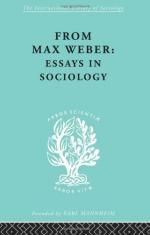|
This section contains 3,424 words (approx. 12 pages at 300 words per page) |

|
SOURCE: "Max Weber's Political Morality," in Max Weber's Political Sociology: A Pessimistic Vision of a Rationalized World, edited by Ronald M. Glassman and Vatro Murvar, Greenwood Press, 1984, pp. 29-38.
Originally presented as a lecture at Hokkaido University in Japan in 1964, the following essay discusses Weber's thoughts on the major political movements of the twentieth century, most notably fascism and totalitarianism.
Since World War II, Max Weber has become as influential and controversial as Karl Marx was before the conversion of the latter's thought into dogma by one-party socialist states. Karl Jaspers, the psychiatrist and existentialist philosopher, saw in Weber "the philosopher of our time." Others have called him the bourgeois Marx. If labels are necessary in this age of slogans, we might call him "the Jeremiah of Imperial Germany."
Ever since his visit to the United States in 1904, Weber deeply feared that Germany, and hence Europe, might well...
|
This section contains 3,424 words (approx. 12 pages at 300 words per page) |

|


